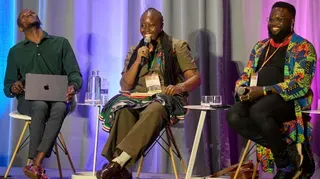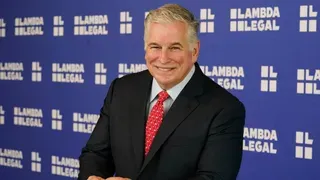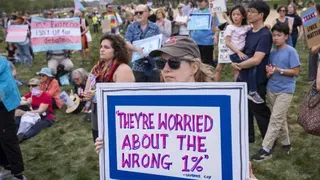July 30, 2012
Nearly 30 Years Later, Whitman-Walker Reconvenes HIV Forum at Lisner
Akeem Favor READ TIME: 4 MIN.
"The AIDS response in this area was born that night in this room," said Councilmember and former President of Whitman Walker Health Jim Graham as he recounted the events of the Washington D.C. area's first AIDS forum, held April 4, 1983. "That night an energy was unleashed that I am proud to say continues to this very hour." On July 24, 29 years later, that energy continued in the same auditorium in which it started, with Whitman-Walker Health's "Return to Lisner: HIV Forum."
Influential figures of the HIV/AIDS and LGBT community came together at Whitman-Walker Health's "Return to Lisner: HIV Forum" Washington, D.C. The event, held at George Washington University's Lisner Auditorium, marks the 29th iteration of D.C.'s first AIDS forum. The forum took place during a week of discussion and activism in the nation's capitol surrounding the 2012 XIX International AIDS Conference.
"This mom couldn't be more proud of my son, Ryan White," said keynote speaker Jeanne White-Ginder, mother of late HIV/AIDS activist Ryan White. "I would ask Ryan quite often, why are you not angry? Why do you not get upset at people?"
Many HIV/AIDS activists remember Ryan White, an Indiana teen who contracted AIDS through infected blood during a hemophiliac treatment, as one of the public faces for HIV/AIDS awareness and research. The Ryan White Comprehensive AIDS Resources Emergency (CARE) Act, which provides help to those lacking the financial resources or sufficient health care coverage to cope with HIV/AIDS, is named in his honor.
"He said, 'Oh mom, they are just trying to protect their own kids like you're trying to protect me," said White-Ginder. "He said, 'When you don't know about something, then you're going to be afraid of it, mom. That's why we have to continue to educate people.'"
With the portion of the AIDS Memorial Quilt that bore her son's panel framed behind her, Jeanne White-Ginder shared the story of her son's life, death and lasting contributions with the audience. Filled with struggles and bravery in the face of adversity, it was overall the story of a teen who wanted to educate others and have the opportunity to be seen not as a danger, but as a person.
HIV/AIDS Activism and Media Fatigue
Led by questions posed by Tom Sherwood, a local reporter from NBC News4-Washington, the panel tackled many complex issues during the forum including educating others about HIV/AIDS, HIV/AIDS activism, inter-generational sexual education, the possibility of hope, the varying levels of attention given to HIV/AIDS by LGBT organizations and the concept of "HIV/AIDS media fatigue."
Panelist JoAnne Keatley, director of the Center of Excellence for Transgender Health at the University of California-San Francisco, brought attention to affect of HIV/AIDS on the often-overlooked transgender community. She noted several issues with transgender individuals getting access to medical treatment and care. She also expressed concern over how the push for treatment as prevention applies to a community that has difficulties getting even basic medical care due to procedural and cultural obstacles.
"We're putting a lot of hope and effort on new medical technologies," said Keatley. "I don't feel we are doing enough to reach out and engage with transgender populations and keep them in care. I don't think that we've made enough investment really training providers to be able to care for transgender bodies. I think a lot of even infectious disease specialists and HIV specialists are not prepared to deal holistically with transgender patients."
Twenty-nine years after the inception of the D.C. HIV/AIDS forum and 22 years after the death and activism of Ryan White, misconceptions and a lack of knowledge about the disease remains.
Executive Director of Metro Teen AIDS Adam Tenner shared a recent experience with Fox News in which he answered questions relating to HIV/AIDS for a period of three hours. According to Tenner, he fielded several questions on whether HIV/AIDS could be transmitted through fleas, mosquitoes and saliva. These were questions, as Sherwood and Tenner noted, that people had 30 years ago.
"I had two separate calls that if somebody was HIV-positive and was in the swimming pool, could they catch HIV from going to the same swimming pool," said Tenner. "To me it underlines a lot of our work in terms of what we have to do really fixing the education so that young people know how their bodies work, know how to protect themselves and know what to do."
Tenner noted that many of the calls that he received weren't coming from kids and teens, but adults.
POZ Magazine Editor-in-Chief Regan Hofmann also commented on the subject, and stressed the responsibility that parents and adults have for educating the younger generation.
"It is shocking, the lack of knowledge," said Hofmann. "I think that grownups would not put a child in the car and not teach them how to drive...yet we send children out into the world without telling them the basic facts of biology and about their lives and about how to negotiate for, in a self-empowered way, what happens to them."
A recurring theme and topic in the events, rallies, and marches spurred by the International AIDS Conference is that of hope. When asked about their feelings regarding hope as it relates to HIV/AIDS treatment, care and prevention, panelists stated that they had hope, but emphasized the work that remains undone and the dedication needed to make hope not just a concept, but a reality.
Akeem Favor is a graduate from Presbyterian College with a degree in English and minors in Business, Business Media, Film, and Politics.






